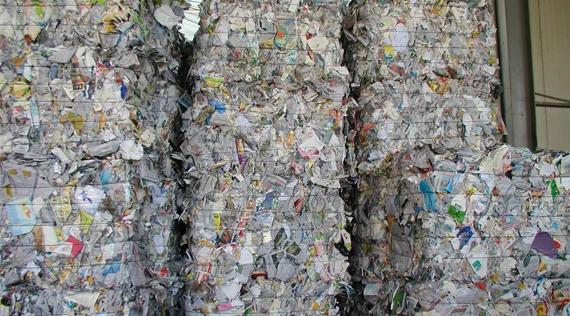
SEATTLE (Waste Advantage): Some U.S. manufacturers are turning trash into treasure after a Chinese ban on imported waste flooded American scrapyards with paper and plastic.
The import ban, announced in July, sent global prices for waste paper and plastic into a tailspin. Without access to their Chinese customers, U.S. waste and recycling firms are scrambling to find new buyers for the scrap they collect from curbside bins. But companies that use recycled materials to make things like cardboard, plastic bins, yarn and other goods are taking advantage.
“America has an endless supply of waste and it just got more endless,” said Anthony Pratt, executive chairman of Pratt Industries, which uses 100% recycled material in its U.S. facilities to make boxes for Amazon.com Inc. as well as firms ranging from major manufacturers to pizza joints.
Plunging scrap prices are also driving new demand for recycled materials, which usually have to compete with growing supplies of new plastic resin made cheaply from shale oil by U.S. plants.
On Wednesday, Target Corp. , Procter & Gamble Co. , Keurig Green Mountain Inc., Campbell Soup Co. , Coca-Cola Co’s North America business and others agreed to require suppliers of industrial plastic items like crates and trash bins to use more “post-consumer” material.
Not all of those companies signed on because of China’s ban, but falling scrap prices have made the requirement an easier pitch, said Dylan de Thomas with The Recycling Partnership, which organized the pledge.
“It’s the definite silver lining of this scrap ban,” he said.
For environmentally conscious firms like Unifi which manufactures yarn and packaging from recycled plastic bottles, China’s new rules help keep down production costs.
“By having more supply, we expect the upward price pressure [on recycled material] will be mitigated,” said Eddie Ingle, Unifi’s vice president of supply chain.
Over two-thirds of America’s wastepaper exports and more than 40% of its discarded-plastic exports ended up in China last year. Paper and plastic scrap exports to mainland China topped $2.2 billion.
China told the World Trade Organization that it wants to limit the entry of “foreign waste.” Under new rules, China by year-end would ban imports of used plastics and restrict some paper-scrap imports.
U.S. buyers can’t replace lost Chinese demand, said Bill Moore of Moore & Associates, a paper-industry consulting firm. It could take a while to build the domestic capacity needed to process our abundant scrap into new products, he said.
If China stands by its proposed restrictions, U.S. recycling businesses will need to invest in machinery to more stringently sort the waste they collect, said Bob Cappadona of Casella Recycling LLC, a waste-services company based in the Northeast. And it also means households will have to do a better job of sorting items headed for recycling, he added.
Courtesy: https://wasteadvantagemag.com
| Copper Scrap View All | |
| Alternator | 0.32 (0.01) |
| #1 Copper Bare Bright | 3.77 (0.07) |
| Aluminum Scrap View All | |
| 356 Aluminum Wheels (Clean) | 0.73 (0.02) |
| 6061 Extrusions | 0.64 (0.02) |
| Steel Scrap View All | |
| #1 Bundle | 475.00 (0) |
| #1 Busheling | 495.00 (0) |
| Electronics Scrap View All | |